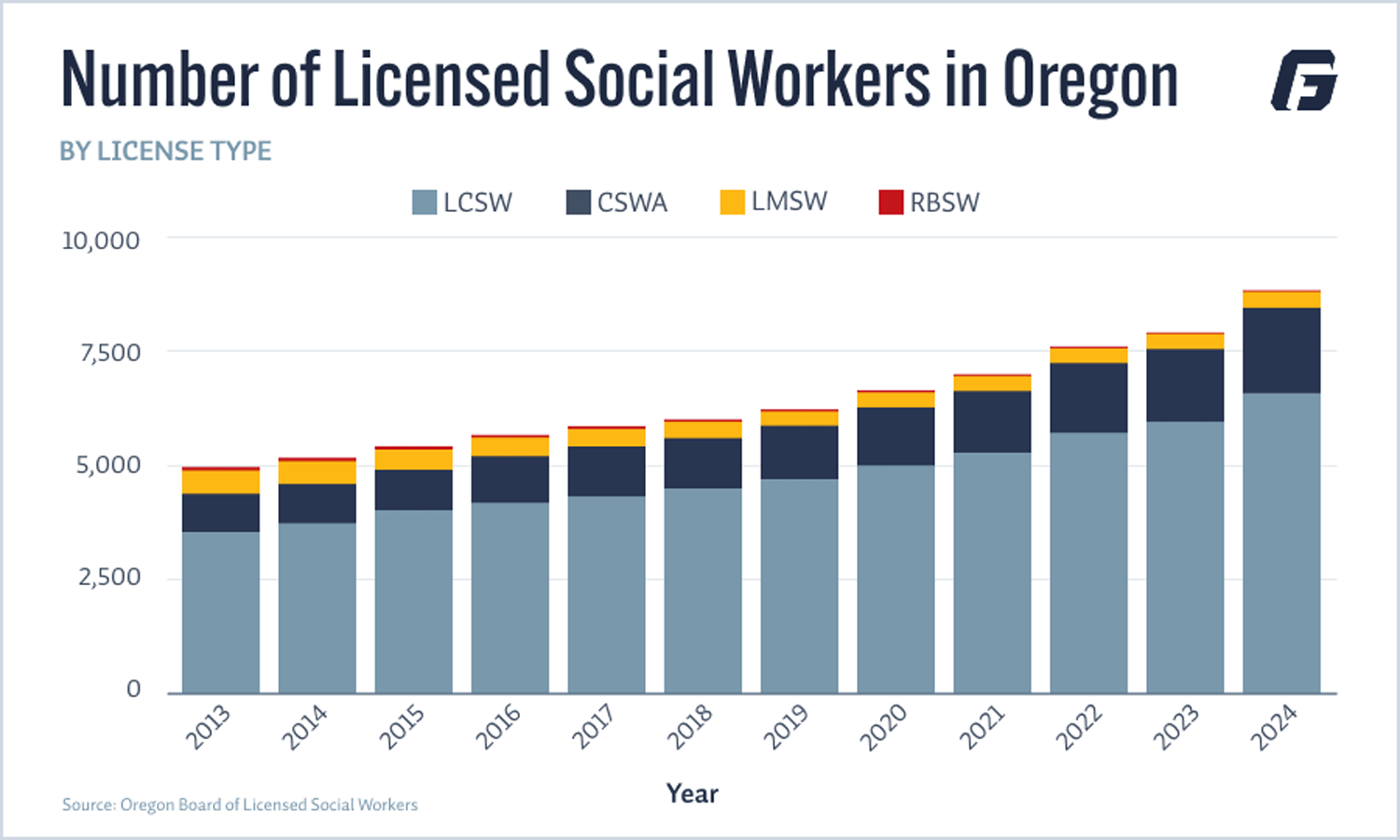
How to Become a Social Worker in Oregon
Last updated in January 2024.
You’ve decided to pursue a career in social work: what’s next? This guide will help you navigate the process of becoming a social worker in the state of Oregon.

As you can see from this flowchart, there are four distinct social work credentials in Oregon with increasing training requirements and levels of independence:
- Registered Baccalaureate Social Worker (RBSW)
- Licensed Master of Social Work (LMSW)
- Clinical Social Work Associate (CSWA)
- Licensed Clinical Social Worker (LCSW)
The minimum requirements to become an registered baccalaureate social worker in Oregon are to complete an accredited bachelor of social work (BSW) program, pass a bachelors-level Association of Social Work Boards (AWSB) exam, and pay a licensing fee. The other three social work credentials require additional training and experience.
How many social workers are there in Oregon?

Source: Oregon Board of Licensed Social Workers, slide #9
Between 2013 and 2024, the total number of licensed social workers in Oregon grew substantially, rising from 4,998 to 8,881 — an increase of nearly 78%. The largest growth occurred among LCSWs, who increased from 3,573 to 6,616, adding over 3,000 licensees and remaining the largest license category.
CSWAs also saw significant growth, more than doubling from 841 in 2013 to 1,880 in 2024, reflecting a strong pipeline of individuals pursuing full licensure. LMSWs, however, declined over the same period, dropping from 508 to 353, suggesting lower uptake or transitions into other license types. RBSWs also decreased, falling from 76 to 32.
Overall, growth has been concentrated in the advanced practice licenses (LCSW and CSWA), while entry-level categories have contracted.
Becoming a Social Worker
Determine Your Career Goals
The first step is to decide what level of social work you want to gain employment. Are you content to be a case manager, performing needs assessments for individuals and/or families, and serving as a liaison between clients and the resources they need? If so, a bachelor’s degree in social work (BSW) will suffice.
If, however, you want to expand your options and find employment in a wider range of venues – including hospitals, schools, mental health clinics, private nonprofits, courts, prisons and veteran’s administration facilities – a master’s degree in social work (MSW) is required.
For those who want to open their own social work practice, working independently and without the need of supervision, you must earn an MSW and successfully pass a national licensure test and apply with the state to become a licensed clinical social worker (LCSW).
Related:
Plot Your Path
Once you determine your career goals, plan accordingly. As part of that process, familiarize yourself with the regulations associated with social work practice.
Here are some guidelines to keep in mind:
- You cannot be a social worker in Oregon without either a bachelor’s or master’s degree from an institution accredited by the Council on Social Work Education (CSWE)
- You may earn a bachelor’s degree in another field (i.e., sociology, psychology, etc.) and a master’s degree in social work to pursue a career in social work
- In Oregon, not just anyone can call themselves a social worker, even if they hold a BSW or MSW. Qualified individuals must apply with the state. Out-of-state licenses may not transfer.
- You may find employment as a social worker with a master’s degree, but you cannot practice clinical social work unless you are registered with the state and are either a clinical social work associate (CSWA) or a licensed clinical social worker (LCSW). The Oregon Board of Licensed Social Workers defines clinical social work as the assessment, diagnosis or treatment of mental, emotional or behavioral disorders or conditions.
Learn more about social work regulations in various jurisdictions outside of Oregon
Educate Yourself
The BSW
Step three in the process is to pursue a degree in the field. You may enroll in a traditional four-year institution with a CSWE-accredited social work program, or earn an associate’s degree at a two-year institution and transfer to a four-year college or university with a CSWE-accredited program to complete your studies. Upon completion of your degree, you will hold a bachelor of social work (BSW).
The MSW
Once you’ve earned your BSW, you may stop there or pursue your education further by applying for admission to a master of social work (MSW) program. This is typically a two-year degree. Some schools, however, offer an advanced standing program that allows you to complete your master’s degree in nine to 14 months if you have completed a BSW degree from a CSWE-accredited program.
Advanced standing standards vary from school to school, but admission is typically determined by grades (most institutions require a minimum of a 3.0 GPA at the undergraduate level), references, and a favorable evaluation of a student’s internship experiences. At the undergraduate level, students must complete 400 hours of internship experiences to meet the minimum accreditation standard.
Evaluate Your Options
Social work licensure in Oregon is overseen by the Oregon Board of Licensed Social Workers (BLSW), whose website offers the most up-to-date information about social work licensing in Oregon.
Non-Clinical Licenses
How to Become a Registered Baccalaureate Social Worker (RBSW) in Oregon
You may find that a BSW meets your career goals. In this case, you must apply with the state for a non-clinical license called the Registered Baccalaureate Social Worker (RBSW), allowing you to gain employment in generalist practice. Oregon has fewer than 100 RBSWs.
RBSW Requirements
- Bachelor of Social Work (BSW) degree from a CSWE-accredited program
- Passing score of 70% or higher on the Association of Social Work Boards (ASWB) bachelors-level exam (application fee: $230)
- Nationwide fingerprint-based criminal background check
- Oregon state licensing application fee of $150
How to Become a Licensed Master of Social Work (LMSW) in Oregon
If you want to pursue a social work career with more options, you must earn an MSW and apply for a Licensed Master of Social Work (LMSW). This allows you to perform many of the same duties as an RBSW but in a wider range of social work settings. It does not, however, allow you to do clinical assessment or set up your own independent social work practice.
LMSW Requirements
- Master of Social Work (MSW) degree from a CSWE-accredited program
- Passing score of 70% or higher on the Association of Social Work Boards (ASWB) masters-level non-clinical exam (application fee: $230)
- Nationwide fingerprint-based criminal background check
- Oregon state licensing application fee of $200
Clinical Licenses
How to Become a Clinical Social Work Associate (CSWA) in Oregon
The first step toward clinical licensure is to apply for a Clinical Social Work Associate (CSWA).
Upon completion, you may conduct clinical social work practice, but only under supervision. Among the places you may find employment as a CSWA are:
- Hospitals
- VA facilities
- Mental health agencies
- Private practice (under supervision)
- Department of Human Resources agencies
- Child welfare agencies
- Courts
- Prisons
- Hospice organizations
CSWA Requirements
- Master of Social Work (MSW) degree from a CSWE-accredited program
- Supervision plan approved by the Board of Licensed Social Workers (BLSW)
- Nationwide fingerprint-based criminal background check
- Oregon state licensing application fee of $260
How to Become a Licensed Clinical Social Worker (LCSW) in Oregon
The most advanced level of social work practice is the Licensed Clinical Social Worker (LCSW). With this designation, you are eligible to practice independently and gain employment in a wide range of settings.
With an LCSW, you may:
- Open your own social work practice
- Provide independent (unsupervised) clinical treatment in a wide range of settings
LCSW Requirements
- Currently or previously licensed in another state, or
- Meet the following LCSW requirements:
- MSW degree from a CSWE-accredited program
- 3,500 hours of post-MSW clinical practice experience (2,000 of which are direct client)
- 100 hours of supervision (with at least 50 being on an individual basis)
- Minimum of 24 months of supervised experience
- Passing score of 70% or higher on the Association of Social Work Boards (ASWB) masters-level clinical exam (application fee: $260)
- Nationwide fingerprint-based criminal background check
- Oregon state licensing application fee of $460
Oregon Rules and Laws Exam
Social workers in Oregon must also pass the Oregon Rules and Laws Exam. This exam is 32 questions long and is open book. You can take it as many times as you need to earn a passing score of 90%.
Social Work Programs at George Fox University
If you're interested in becoming a social worker in Oregon, George Fox can help you make it happen with one of our CSWE-accredited programs: